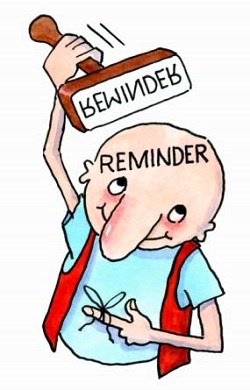
Forgetfulness is a very common trait among a large majority of people. “Oops! I forgot. Please excuse me” is a commonly heard refrain. From forgetting birthdays and anniversaries, due date of paying fees, last date for submitting a project or conveying an important message, it can create havoc in our lives.
Researchers have delved into the fascinating subject of memory for years. They have tried to dissect its properties and functioning without achieving complete success. Memory is an elusive concept and experts still don’t have a clear picture of how our memory behaves.
Memory refers to the storage, retention, recall of data including past experiences, knowledge, thoughts etc and can vary greatly according to the individual and his state of mind. It can also vary according to the content of the information itself; thus information that is novel or exciting tends to be better remembered than mundane things. Failure of memory can result from failure to adequately store the information in the first place failure to retain the information, and failure to retrieve the information later.
People often have selective memory. My mother remembers the birthdays and wedding anniversaries of all her friends and acquaintances but she cant remember phone numbers or car numbers. “I am interested in my friends, so their important dates are etched in my memory,” she says.
Many people have selective memory in that they remember good things and tend to forget negative ones or vice versa. Some people remember everything about a particular person, but are quite blank about others.
Scatter brained people abound around us – who go to the market but forget to buy some important items, whose bills are not paid by the due date, who forget to attend important meetings, who forget to pick up a friend / spouse/ colleague/ kids at a pre-appointed place and time and so on. There are people who often misplace keys, important papers etc and spend hours looking for them.
The precise biological mechanisms of memory are not fully understood, but most scientists believe that memory results from changes in connections or connection strengths between neurons in the brain. Psychologists and memory researchers divide memory into categories. Short term memory refers to memories that last for periods between a few minutes and a few days while long term memory is what remains embedded in the brain much longer. Alternatively, short term memory can be seen as memory for events that occurred recently and long term memory concerns events in the distant past (eg childhood for adults). One can have a good long term memory while suffering from short term memory loss, and vice versa.
How can one cope with forgetfulness? Its no wish just wishing it away. Here are some tried and tested tips for jogging your memory:
 Lists, lists, lists: “To do” lists, shopping lists, reminder lists and more – the lists are a great help to those who are prone to forgetting. Keep a pad and pen handy and jot down whatever you want to remember at a later time and date. Nowadays you can also use the computer or cell phone to remind you.
Lists, lists, lists: “To do” lists, shopping lists, reminder lists and more – the lists are a great help to those who are prone to forgetting. Keep a pad and pen handy and jot down whatever you want to remember at a later time and date. Nowadays you can also use the computer or cell phone to remind you.
- Write short notes: Soon after attending a meeting or a class, write down a brief about it, so that you can recap it later. Short notes are invaluable reference material. As a teacher who takes many classes/workshops, I always jot down what I taught in each class/section as soon as I come out of the class.
- Shopping and phone lists: Imagine your mother sent you to get a packet of tea and you came back with a packet of biscuits instead! Its better to make a list when you for shopping, even when you go to buy stationery items. Keep a note pad near the phone to jot down important messages or phone numbers.
- Train your brain: If you are apt to forget faces and names (which can lead to very embarrassing situations), train your brain to identify some object or color with a person’s name or face, e.g. Pinky can be visualized as a pink rose, Sagar as standing amidst the blue ocean, Reena as rhyming with Veena and so on. When you get new information, link or associate it with something already familiar to you.
- Diary: Maintaining a diary is an invaluable asset. Note down all important dates in your diary and refer to it every day. I have three diaries, one at home, one at work and a small one in my purse, and I update each one every day. My colleagues and friends often refer to me when they want the date of a meeting, a party, a holiday or whatever. Though I am not very forgetful by nature, I don’t take any chances and rely on my good old diary.
- Mobile: Technology has made our lives simpler. Most cell phones have a ‘Reminder’ system as well as a ‘To do’ list which you can use. You can also set the alarm if you want to be reminded about an important class, match, meeting or whatever. It is a great boon if one tends to get too engrossed in one’s work.
- Procrastination: Forgetfulness and procrastination go hand in hand. As far as possible, do not put off work – one tends to forget it easily, specially if its not on one’s top priority. If you have promised someone to return his books or notes, or pick up your clothes at the Dry Cleaners, do so while you remember it. Delaying only complicates matters and you put yourself under extra tension.
- Post its: The colorful sticky post its are invaluable for inveterate ‘forgetters’. I have a friend who uses it everywhere – on the bathroom mirror, on the frig, office soft board and even on his car wind shield to remind him about various things. “I feel relaxed after pasting a post it”, he says, “At least I don’t have to rack my brain trying to remember so many things”.
- Devise ways: You can improvise on ways to combat forgetfulness. I always keep any important papers to be taken to office along with my car keys- that way I will never leave them behind. Run through a mental check before you leave for school/college, it will save you a lot of hand-wringing later.
- Get organized: Ask your parents to get you a planner and keep track of all your present and future classes /tuition /assignments /exams /matches and so on. Encourage your siblings to keep their things at the proper place. Try to plan everything to the last detail, even if you are having you birthday party at home. It will save you a lot of time and energy.
- Memory exercises/games: There are a number of memory exercises and games as well as mentally stimulating activities (chess, card games, scrabble, quiz etc) you may like to try, as well as self help books on improving your memory which are quite effective. Many websites also have valuable tips for such people. Research has proved that playing games such as crossword puzzles, cryptograms, word searches etc can help with information recall.
- Self discipline: If you know you are prone to forgetting, maintain a record of what you have to do; don’t trust your brain to do all the remembering automatically. Discipline helps your mind to be on guard. Checking and double checking never harmed anyone, neither did two minutes to make a mental or paper checklist. Analyze under what conditions you forget things (stress, anxiety, ill health, pre occupations etc) and tackle it accordingly.
- Information load: To help you remember better, shorten sentences for better understanding. Try to remember the key words and phrases rather than the whole article or note. Break up larger pieces of information in order to focus better. Repetition is also important for the accurate recall of data.
So go ahead and take charge of your capricious memory instead of letting it play havoc with your life. A little bit of self discipline and motivation will go along way in improving your memory and freeing you of the tag of ‘feather brained’.
Images under license with Gettyimages.com

 Lists, lists, lists: “To do” lists, shopping lists, reminder lists and more – the lists are a great help to those who are prone to forgetting. Keep a pad and pen handy and jot down whatever you want to remember at a later time and date. Nowadays you can also use the computer or cell phone to remind you.
Lists, lists, lists: “To do” lists, shopping lists, reminder lists and more – the lists are a great help to those who are prone to forgetting. Keep a pad and pen handy and jot down whatever you want to remember at a later time and date. Nowadays you can also use the computer or cell phone to remind you.